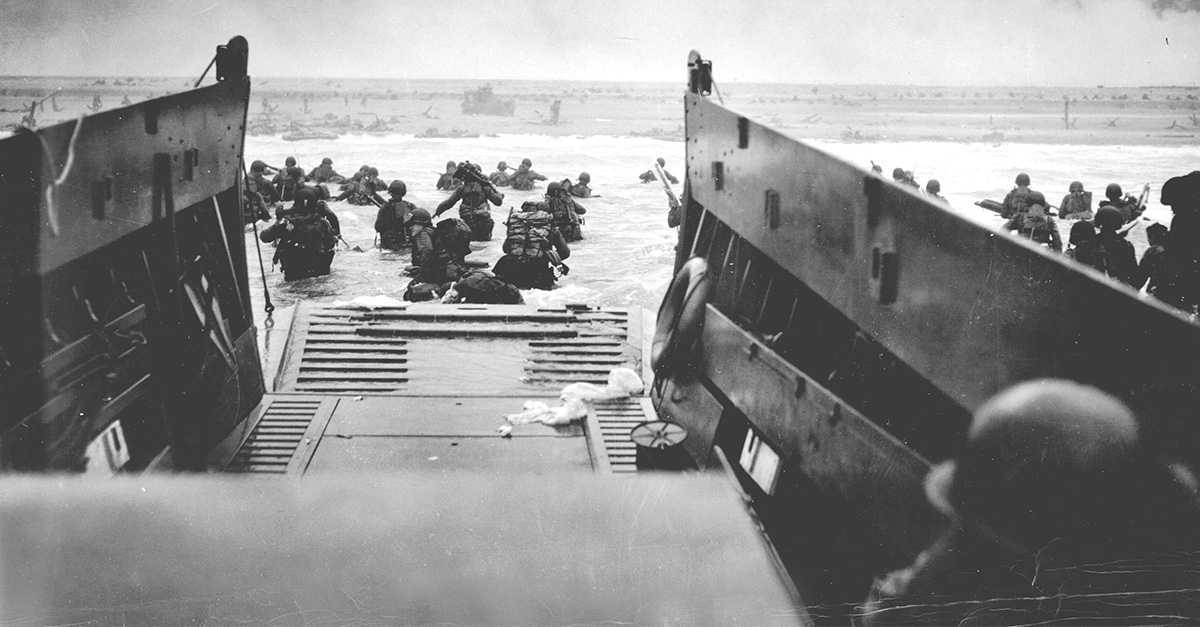


Get a free copy of Parental Rights & Education when you subscribe to our newsletter!

The young men who survived Europe’s greatest battles came home and quietly lived their lives in the decades after the war, but some were kind enough to occasionally share their stories with me and provide a small glimpse into the uncommon valor that was so common to their generation.
I have been blessed in my life to know and work for several WWII veterans. Not all were present at D-Day 80 years ago today, but several were. And all were in intense battles.
As a teen I worked for a physician farmer who, in the Southern tradition, I called “Mr. Richard.” Mr. Richard drove one of the first-generation Toyota four-wheel-drive pickups. The cab was a bit small. Sometimes he would transport us from one farm to another in the beautiful North Alabama countryside, where I had spent two summers as a teen. One day we were driving along, having some nice small talk and Mr. Richard began to sweat profusely. He tugged at his collar and fidgeted uncomfortably in the driver’s seat. Suddenly he pulled the truck over.
“I’ve gotta get out.” He choked out the words.
He stepped out of the truck and paced along the shoulder of the road. He grasped his head in his hands. I sat silently, unsure of what I was witnessing. Later I told my Dad about it, and he informed me that Mr. Richard had been a tank commander in the Battle of the Bulge where he had had three tanks blown out from under him in 24 hours of continuous combat. The last one was engulfed in flames. Mr. Richard was one of two survivors.
But Mr. Richard was also a thoroughgoing southern gentleman. One day, somewhere in the most rural parts of Alabama, where he had directed me to drive a tractor several miles down the highway from one farm to another, he caught up to me in his truck and motioned me to pull over at an ancient country crossroads store. I’d never been to the store before. We went inside where he introduced me to the elderly couple who owned the place. We had a wonderful lunch of sardines, crackers, an ample slice of cheese from a wheel beneath glass, and a ‘co-cola’ pulled from the old chest freezer, flecks of ice still clinging to the green bottle, the way Coke was meant to be enjoyed.
Another day, the old International Harvester broke down and we spent the hot morning working on it together. For the first time he invited me into his home, and even as an 18-year-old I sensed I’d passed some unwritten test. His wife had prepared lunch of hearty sandwiches and my first taste of real Louisiana gumbo. They were a greatest generation couple…the salt of the earth.
Later in life, while a student at the University of Georgia, my sister introduced me to retired Col. Bill Bremer. Col. Bremer served as a 1st lieutenant under Gen. George S. Patton. Bill was present the day Patton, as depicted in the classic motion picture of the same name, roared along the shoulder of the road because his column of tanks and men were stuck on the road in a traffic jam. Patton, with expletives flying from his mouth, ordered soldiers to pick up his jeep and move it across the road. Once back on the ground, he sped forward at breakneck speed, clearing the traffic jam and saving countless lives. I hung on Bill’s every word.
In my 30s I would work at power plants with several WWII vets that I knew only in passing. There was one, however, who I made a point to sit and talk to for at least an hour one day. Carl Remy was a waist gunner on a B-24 bomber. He was shot down on his first mission over Germany. The entire crew parachuted and survived. They hid in a German forest until nightfall, and per their training, began to move back toward American lines at night. This went well for several days, but in Carl’s words, they “got cocky and impatient” and began to move during the day. They were captured at gunpoint by a group of German farmers and turned over to the German army. Carl served the rest of the war as a POW. He said the Germans actually “treated them halfway decent, only the food was lousy.”
Carl said he was never afraid for his life in the POW camp until they were “rescued” by the Russians. The Russians ordered the unarmed American prisoners at gunpoint to join them in raping and pillaging the nearby German town, but the Americans instead found places in town to hide from the Russians and refused to participate in these war crimes. As things began to settle down, Carl and two fellow Americans escaped from the town on a rural road. Outside of town they found a mother, two toddlers, and an infant in a stroller, all shot through the forehead by the Russians.
Just across the river here in Metropolis lived one of the great heroes of the 82nd Airborne who parachuted into St. Mere Eglise. You saw his role depicted in the motion picture, “The Longest Day.” His parachute got hung on a church steeple and he hung there all day, witnessing a raging battle beneath him. German soldiers shot at him multiple times, but he played dead and survived without a scratch.
Dr. Joseph Baugh was a 77-year-old physician who conducted my company physical in 1993. I’d read his name in the same book that “The Longest Day” was based on. As he got ready to begin the physical, I interrupted him by saying, “You jumped with the 82nd at St. Mere Eglise, didn’t you?” He turned, toward me, shocked.
“How in hell did you know that?” he asked.
I told him about the book I’d read.
“Ah yeah,” he said, leaning against the exam table. “I was full of piss and vinegar back then. You know what was on my mind that day? I kept thinking, these Germans are gonna kill me before I ever have a chance to be in love. But after we fought our way into Germany, I met a little German frauleine and we had a summer romance like you wouldn’t believe. After a few weeks though, they told us that the Russians were going to be allowed to take that part of Germany. I knew I had to get her out of there.
I took all the army pay I’d saved up and paid a farmer to let her ride on the back of an ox cart out of the country. I can still see her, sitting on the back of that cart with just one little suitcase, dressed in her Sunday best. I never saw her again…no idea what happened to her. Europe was chaos in those days.”
Then he stared into space for a moment before looking back at me and exclaiming, “Aww hell, you look healthy to me.”
He signed all my papers and never even checked my blood pressure.
One veteran, who I knew only tangentially, told his son, who I worked closely with, “You don’t know. You cannot fathom what we went through, so you can be free.”
It sickens me on this, the 80th Anniversary of D-Day, how we are laying those freedoms on the altar of sacrifice to paganism and her sister, leftism. We are giving our nation away for free to those who despise us and our Constitution.
One cannot help but reflect on the words on D-Day of Admiral Chester Nimitz, whose fleet of ships transported those 18 to 20 year olds onto machine gun-strafed beaches in their attempt to rescue Europe, when he said, “Uncommon Valor was a common virtue.”
Chris Skates is a novelist, columnist, and former speechwriter for two administrations.
If you like this article and other content that helps you apply a biblical worldview to today’s politics and culture, consider making a donation here.
